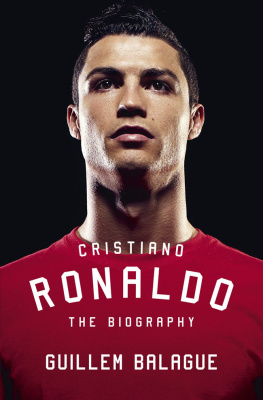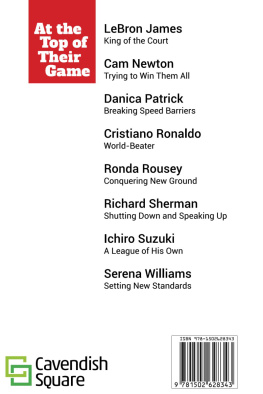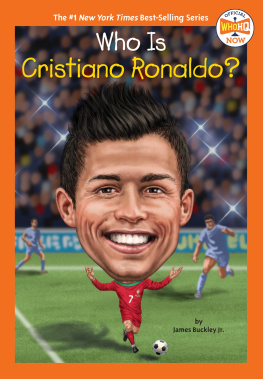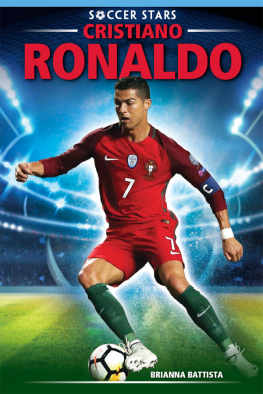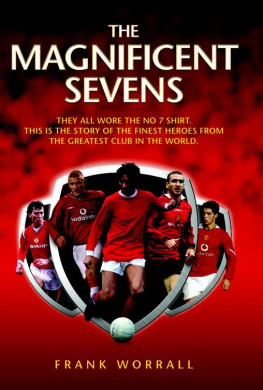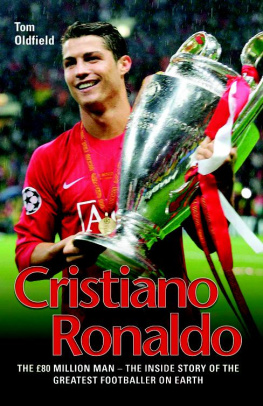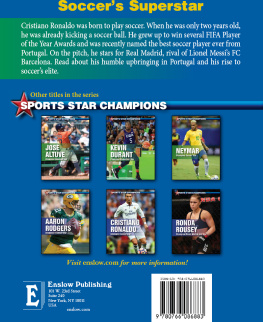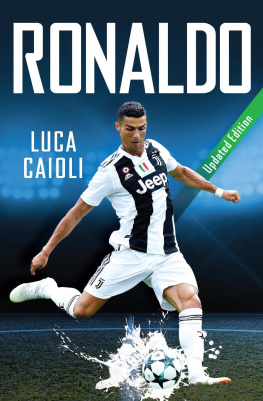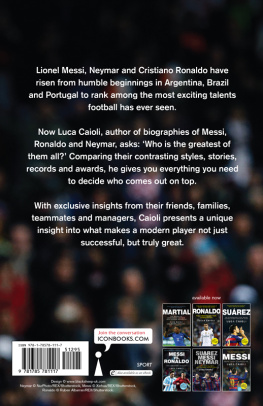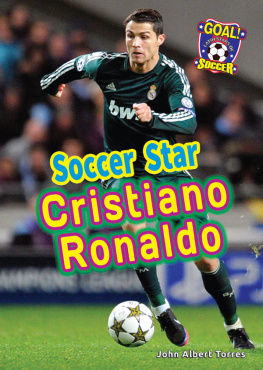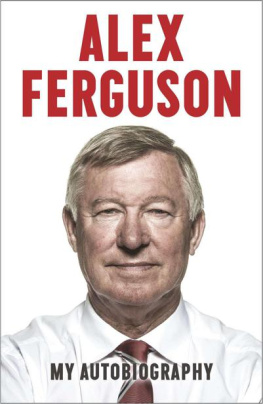
GUILLEM BALAGUE

To R.
I did say you were not going to appear in the book...
CONTENTS
All quotations taken from secondary sources have been numbered in the text, with a full list provided in the bibliography. All other quotations, unless otherwise stated in the text, have been taken from interviews I have conducted or from statements at press conferences, post-match interviews and the like. All other insights have come about as a result of the extensive investigations that I have carried out for this book.
Guillem Balagu
September 2015
News is circulating that I allegedly made offending remarks regarding Lionel Messi. This is absolutely false and I have assured my lawyer takes action to sue those responsible. I have the utmost respect for all my professional colleagues, and Messi is obviously no exception.
Cristiano Ronaldo on Facebook, 11 November 2014
Ronaldo, or whoever writes his Facebook content, was referring to statements of his that I had included in my book entitled Messi (Orion, 2013), the first authorised biography of the Argentinian footballer.
When I found out about his reaction on Twitter, I decided to take a step back. Clearly there was going to be uproar.

According to Manu Sainz, a journalist who was Ronaldos spokes-person over those controversial days, the Portugueses anger while on international duty with his country was rife. And the player wanted to respond as soon as possible in the most public way.
Had he not done so, the accusation, defamation or comment (depending on how you viewed it) could have gone unnoticed.
Ronaldo was attempting to crack a nut with a sledgehammer and did so by sending the above message to his one hundred million followers. Why? He would be crossing paths with Messi in a friendly match in Manchester in the coming days. He could meet him face to face and deny the allegation. My allegation. The story I was told by people very close to Cristiano.
In reality, the offending paragraph had been in the public domain for eleven months.
Why was there such a dramatic reaction almost a year after the publication of his rivals biography?
That week, with no domestic matches to report on and only international games, the Daily Telegraph chose to publish two extracts from the paperback edition of Messi which had just been published. In fact, the English daily newspaper selected two excerpts already featured in the hardback eleven months earlier (Arsenals attempt to sign Leo and the relationship between Messi and Ronaldo) and it all kicked off.
The media (initially in Spain, but then the social networks got hold of it and it quickly spread to all corners of the globe) grabbed hold of one word, took it out of context, twisted it and, in Spain, translated it incorrectly. Could that word define the most distinguished rivalry in the history of football? My career was judged and debate ensued over whether or not such things are said in a dressing room full of adrenalin-infused warriors.
The word was motherfucker.
That is how I said Ronaldo referred to the Flea in front of his team-mates in the dressing room.

By that point, I had already begun research on my next book. This one.
I had spoken to Cristiano regarding the possibility of chatting about his life, his way of thinking, his past. Yes, of course, no problem, he told me on four separate occasions. I had also conversed with his agent Jorge Mendes, who agreed to collaborate just ten days before that Facebook post, although both of us questioned whether or not it was a good idea. I will explain why later.
I went to the Derbyshire Peak District in order to take advantage of the international break. While out jogging, I could not stop asking myself what made him respond in that way. Was a legal threat necessary?
Other people are better suited to such conflicts than me. Johan Cruyff used to say that he wanted to know where the line separating those who loved him and hated him lay, just so he would know who to fight against. Frank Rijkaard once told me that he would feel awful if he found out that even one person hated him. I know what you mean, Frank.
I spent plenty of time around the English countryside over those days. I started focusing on the colours, aromas, the sound of the branches cracking, but all that was blurred by the new questions swirling around my head.
What can we learn about Ronaldo if we study his reaction? Was I changing my perception of him and my desire to study him? What would happen to the collaboration that had been discussed? For a start, I was unaware that my influence was such as to prompt him to react with such opprobrium. The media circus had gone to town. It was another one of those storms that surge when the names Messi and Ronaldo are uttered in the same sentence. Especially during an international break with the resultant paucity of football news.
What else was happening at the time for him to feel compelled to write such a message? There had to be more to it, something that set his alarm bells ringing.
It finally hit me some time later: there were ten days to go before voting for the Ballon dOr closed, an award that Ronaldo was the favourite to win for the third time.
Surely his Facebook post was not just a way to prevent people from changing their vote in that years Ballon dOr. Or was it?
And what to say about the medias reaction?
The subject became big news and received what I consider disproportionate coverage in sports sections in newspapers and on the radio, especially in Spain. On the very night of Ronaldos post, I spoke about the issue on Onda Cero, the radio station I work for. I did not want to do it; I wanted the Messi book to speak for itself. But I had just been involved in an interview with Real Sociedad president Jokin Aperribay for the radio programme Al primer toque and the presenter, Hctor Fernndez, to whom I still owe various favours, convinced me to say something, whatever it might be.
I came out with what I have repeated ever since: Its all in the book.
This is what you can read in the Messi book:
Ronaldo, perhaps as a symptom of the immaturity that marks so many footballers, thinks it necessary to put on a brave face in front of his team-mates, not be scared of Messi and to rise to the challenge. All very macho; very false. And that is why, according to some Real Madrid players, CR7 has a nickname for him: motherfucker; and if he sees someone from the club speaking to Leo, he also ends up being baptised motherfucker. In that environment, Ronaldo usually compares their relationship with that between the Republic of Ireland and the United Kingdom. And the Madrid players, with their less than subtle dressing-room sense of humour, have a long list of jokes that include Messi as Ronaldos dog or puppet, or kept in a designer handbag belonging to the Portuguese player. And much worse.
Next page
